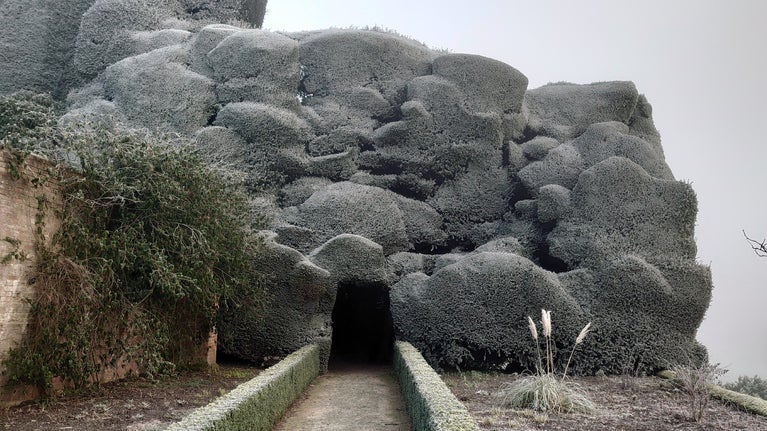
Discover more at Powis Castle and Garden
Find out when Powis Castle and Garden is open, how to get here, the things to see and do and more.

Wales is famous for its rugged landscapes and castles but less known for its beautiful gardens. Stretching out beneath the medieval castle is one of the finest gardens in Britain. With dramatic terraces, an Orangery, an Edwardian formal garden and a peaceful wooded landscape, there is so much for you to explore.
Pull on your winter woollies and take a stroll around the garden. Whether you’re a keen garden enthusiast or just appreciate the joy of the outdoors, you’ll find there’s lots waiting to be discovered at Powis.
Once the leaves have fallen and shrubs are lying dormant waiting for spring, it's time to appreciate the beauty in the structure of the garden, an element overlooked when the borders are in full bloom.
As you stroll along the Top Terrace enjoy spectacular far reaching views across and the deer park. Long Mountain and Breidden Hills are often topped with a fine dusting of winter frost at this time of year.
A walk through our formal woodland, the Wilderness, is a totally different experience in winter. The bare branches of trees lend different shapes and textures to the canopies above whilst revealing beautiful vistas of the castle and terraces that are hidden away during the rest of the year.
If you’re lucky you may even spot a delicate carpet of snowdrops or cyclamen beneath the trees, indicating that spring is already just around the corner.
Meander through the world-famous garden and discover notes from the gardening team which give top tips on how to look after plants over the colder months. Keep an eye out for wildlife on your route, you may just spot a red robin, birds of prey or Egyptian geese which can sometimes be seen as they journey to the Dairy pond.
From 1 November to 28 February, well behaved dogs on leads can come and explore the garden at Powis Castle. A number of dog-friendly activities will be popping up around the garden to ensure they have a pawsome time.

Beneath the castle and blasted out of the bare rock, are the Italianate Terraces which are considered the finest surviving example of a 17th century terraced garden in Britain.
From their position high up on the hillside you can admire breath-taking views across the garden, deer park, and in the distance, the pointed profiles of Long Mountain and the Breidden Hills.
Admire herbaceous borders flowering with a profusion of perennials, dancing lead and stone statues, an Aviary that once housed birds of prey and an orangery with a grand 18th-century stone doorway that was once the entrance to the castle itself.
This area was once a Kitchen Garden but in 1912 Violet, Countess of Powis, oversaw its transformation into a formal flower garden.
Here you can stroll along avenues of ancient apple trees, enjoy the shade beneath the vine arch, admire seasonal colour and relax as you listen to the sound of water falling in the Fountain Garden nearby.
Our dedicated gardening team have planted 18,000 snowdrops in the garden over the past two years. Enjoy a refreshing winters walk and enjoy the joyful display.

In the Fountain Garden admire the topiary of the trimmed trees and hedges. View their long shadows in the low afternoon light across the grass.
Look out for the wrought-iron gates, a gift from Lady Violet to her husband George, 4th Earl of Powis, featuring the vibrant Herbert family crest of an Elephant and Griffin keeping an eye on the garden.
It’s impossible to miss one of Powis’ most famous features, its 300-year old yew tree hedges. Looking back to the castle from anywhere in the garden you can see the cloud-like forms of the 14 giant tumps and the 30 foot high hedge will remain in your mind long after your visit.
The wooded ridge opposite the castle, is known as the Wilderness. It’s less formal than the rest of the garden and is the perfect place for a woodland walk with incredible views.
Walk alongside great oaks, rhododendrons and exotic trees. Stop by the Stable Pond, the Ice House or the Plunge pool, which are surrounded by ferns. Uncover unique sculptures and admire the view of the castle across the Great Lawn.

Find out when Powis Castle and Garden is open, how to get here, the things to see and do and more.

Discover a paradise garden in Wales, with 300 hundred years of garden transformation providing many layers of history to explore.

Powis Castle and Garden is a one pawprint rated place. Find out more about bringing your dog to Powis Castle and Garden. Take in a view of the castle with a drink and bite to eat and your four-legged friend by your side. Explore the garden 1 November - 28 February.

After exploring the castle or traversing the terraces, refuel with a tasty treat from our Courtyard Café or take home a gift from the shop to help you remember a great day out.

Powis is a Welsh castle built by a Welsh prince, Gruffudd ap Gwenwynwyn (c1252). It survived wars and division to become one of the most prominent castles in Wales.